
ChatGPS(hopping)
The TLDR
OpenAI has updated ChatGPT Search with a new shopping feature that delivers personalized, ad-free product recommendations using natural language. Users now get curated results with images, reviews, and purchase links—offering an intuitive alternative to traditional, ad-driven search engines.
Imagine being able to talk to your virtual assistant about products as if it were a knowledgeable friend—rather than navigating through a flood of sponsored results, as with traditional search engines. OpenAI is now making this a reality with a significant update to ChatGPT Search.
The new shopping feature, released on April 28, 2025, for all ChatGPT user levels, is transforming the way we search for products online. Instead of presenting standardized lists of results, ChatGPT now offers personalized product recommendations with images, reviews, and direct links to purchase pages – all controllable via natural language queries.
OpenAI's approach to displaying results is particularly noteworthy: unlike Google, the company does not generate advertising revenue through preferential placement. Instead, results are based on structured metadata such as prices, product descriptions, and authentic user reviews. With more than a billion weekly search queries, ChatGPT is establishing itself as a serious alternative to traditional search engines.
What does this paradigm shift mean for the future of e-commerce? Will we say goodbye to algorithmically optimized search results and enter an era of conversation-based, personalized online shopping?
Why it matters
This strategic move by OpenAI could reshape the entire digital advertising market by challenging the paid placement model that has dominated for decades. The integration of AI-powered shopping advice without commercial bias could restore consumer trust and establish a more transparent e-commerce standard.
Ad
🚨 Want to become famous(er), grab more customers, and 100X your reach?
Stop burning budget on ads and hoping for clicks. Podcast listeners lean in, hang on every word, and buy from guests who deliver real value. But appearing on dozens of incredible podcasts overnight as a guest has been impossible to all but the most famous.
PodPitch.com is the NEW software that books you as a guest (over and over!) on the exact kind of podcasts you want to appear on – automatically.
⚡ Drop your LinkedIn URL into PodPitch.
🤖 Scans 4 Million Podcasts: PodPitch.com's engine crawls every active show to surface your perfect podcast matches in seconds.
🔄 Listens to them For You: PodPitch literally listens to podcasts for you to think about how to best get the host's attention for your targets.
📈 Writes Emails, Sends, And Follows Up Until Booked: PodPitch.com writes hyper-personalized pitches, sends them from your email address, and will keep following up until you're booked.
👉 Want to go on 7+ podcasts every month? Book a demo now and we'll show you what podcasts YOU can guest on ASAP:
Graph of the Day
We are living longer and longer

Partial cell reprogramming about to make the leap into the clinic
Harvard researchers and Life Biosciences want to inject three Yamanaka factors directly into damaged optic nerves for the first time in order to reverse eye infarctions - without the risk of tumors. If the experiment succeeds, the same technique could in future tackle glaucoma, dementia and the like at their epigenetic root. The step marks the transition from mouse miracle to clinical reality and sets new standards for purely programmable rejuvenation therapies
AI robotics lab discovers senomorph Rentosertib
Insilico Medicine combined generative AI design with a fully automated robotics lab and discovered Rentosertib in just 18 months: the molecule inhibits the senescence protein TNIK, reduces age markers and is already in Phase 2 trials against pulmonary fibrosis. This coup shows how AI can radically shorten development times and pave the way for multi-purpose drugs that simultaneously curb cell ageing and chronic diseases.
Immune resilience as a new longevity target
A study involving 17,500 people identifies the T-cell gene TCF7 as a driver of “immune resilience”, which buffers chronic inflammation, immune deficiency and cell death. From the age of 40, high resilience reduces mortality by 70% and gives a calculated 15.5 years of life. This brings a clearly measurable marker into focus: mid-life vaccination boosters, lifestyle optimization and AI-supported therapies could be tailored to immune resilience in the future in order to sustainably extend healthspan.
Poll of the Day
In The News
Meta Launches Stand-Alone AI Assistant App to Compete with ChatGPT and Rivals
Meta has unveiled a dedicated AI assistant app powered by its Llama model, entering direct competition with ChatGPT and other major platforms like Claude, Grok, and Gemini. The app features a Discover feed that showcases user interactions and suggested prompts. This move marks Meta’s boldest step yet in the AI arms race, following the integration of Meta AI across its apps earlier this year. With nearly 700 million users already, Meta aims to reach over a billion in 2025 as it hosts its first-ever LlamaCon developer even
Zuckerberg Predicts AI Will Surpass Individual Human Intelligence
Mark Zuckerberg believes general intelligence is on the horizon, with AI systems soon becoming smarter than any one person. He envisions a future where individuals harness the capabilities of what feels like a 10,000-person organization through AI.
Seoul Researchers Develop Shape-Shifting Liquid Robot with Unmatched Flexibility
Scientists at Seoul National University have developed a Particle-armored liquid roBot (PB), a liquid-particle composite that can deform, engulf objects, and merge while maintaining structural integrity. This breakthrough enables robotic functions previously impossible with traditional rigid designs.
Quote of the Day

Hi All,
Thank you for reading. We would be delighted if you shared the newsletter with your friends! We look forward to expanding the newsletter in the future with even more specialized topics. Until then, follow us on social media to stay up to date.
Cheers,
Dan












